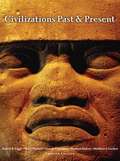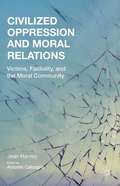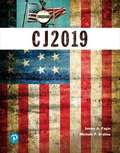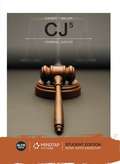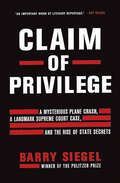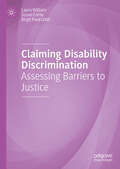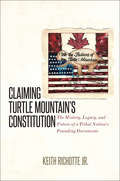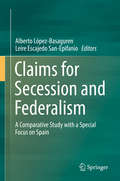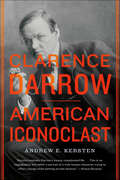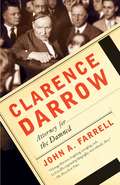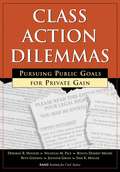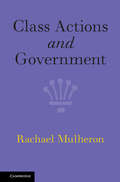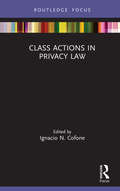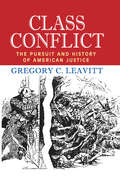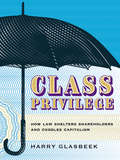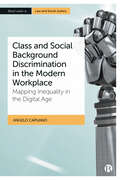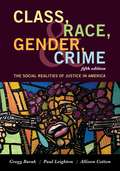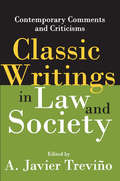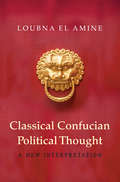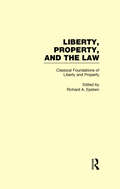- Table View
- List View
Civilizations Past & Present, Combined Volume, Twelfth-Edition
by Barbara Molony Neil J. Hackett George F. Jewsbury Robert R. Edgar Matthew S. GordonThe twelfth edition of Civilizations Past & Present continues to present a survey of world history, treating the development and growth of civilization as a global phenomenon involving the interaction of all of the world's cultures. This new edition, like its predecessors, includes all the elements of history--social, economic, political, military, religious, aesthetic, legal, and technological--to illustrate this global interaction.
Civilized Oppression and Moral Relations
by Jean HarveyThere are significant differences between civilized oppression and violent oppression and these differences show not only in the phenomena involved, but also in the nature of those who actively contribute to the two phenomena ('contributing agents'). Fair characterizations of the agents of civilized oppression often require very different descriptions from those applying to violent oppressors. Many of the failings behind civilized oppression are shared by both the contributing agents and alarge number of the victims. Often it is the privileged social position of the agents that allows those failings to have such a serious impact, whereas the same failings in the victims may be fairly innocuous (though they are not always). This book is alert to this and other differences between civilized and violent oppression. Jean Harvey examines what the moral relations should be between the key players in civilized oppression: the agents, victims, and 'bystanders'.
Cj
by Roger Leroy Miller Larry K. GainesDesigned for, and in partnership with, today's learners, CJ3 was developed to offer a shorter, more affordable book--a book that users will actually WANT to read. The concise, magazine-style format includes all of the key concepts that readers need to learn and a full suite of learning tools to accommodate busy lifestyles--including videos, games, chapter-by-chapter study cards, self-quizzes, downloadable flashcards, and more.
Cj 2019
by James Fagin Michele BratinaCJ 2019 engages students with real criminal justice issues using interactive components and eye-catching visuals. Students explore a repertoire of current events and the resulting challenges faced by practitioners in the subfields of law enforcement, correctional management and administration, and the US court system. Along the way, learners critically consider the cross-systems nature of crime, law, and justice as well as the benefits of integrative approaches to problem-solving. Building on CJ 2010, this 2019 edition adds current events, victimization theories, and significant new content representing changes to the field of criminal justice in 2017 and 2018. CJ 2019, 1st Edition, is also available via Revel(TM) , an interactive learning environment that enables students to read, practice, and study in one continuous experience.
Cj5
by Larry Gaines Roger MillerLearn Criminal Justice YOUR Way with CJ! CJ's easy-reference, paperback textbook presents course content through visually-engaging chapters as well as Chapter Review Cards that consolidate the best review material into a ready-made study tool. With the textbook or on its own, CJ with MindTap allows you to learn on your terms. Read or listen to textbooks and study with the aid of instructor notifications, flashcards and practice quizzes. Track your scores and stay motivated toward your goals. Whether you have more work to do or are ahead of the curve, you'll know where you need to focus your efforts. And the MindTap Green Dot will charge your confidence along the way. When it's time to study, everything you've flagged or noted can be gathered into a guide you can organize.
Claim of Privilege: A Mysterious Plane Crash, a Landmark Supreme Court Case, and the Rise of State Secrets
by Barry SiegelOn October 6, 1948, a U.S. Air Force B-29 Superfortress crashed soon after takeoff, killing three civilian engineers and six crew members. In June 1949, the engineers' widows filed suit against the government, determined to find out what exactly had happened to their husbands and why the three civilians had been on board the airplane in the first place. But it was the dawn of the Cold War and the Air Force refused to hand over any documents, claiming they contained classified information. The legal battle ultimately reached the Supreme Court, which in 1953 handed down a landmark decision that would, in later years, enable the government to conceal gross negligence and misconduct, block troublesome litigation, and detain criminal suspects without due-process protections.Claim of Privilege is a mesmerizing true account of a shameful incident and its lasting impact on our nation—the gripping story of a courageous fight to right a past wrong and a powerful indictment of governmental abuse in the name of national security.
Claiming Disability Discrimination: Assessing Barriers to Justice
by Susan Corby Laura William Birgit PauksztatResearch shows that when accessing and retaining work, and when seeking promotion, disabled people often face discrimination and disadvantage that can be unlawful. Obtaining a remedy is no easy matter as, although access to justice and a fair public hearing are key human rights, disabled claimants often face barriers in Employment Tribunals. Using a unique and bespoke dataset, this book examines the factors that determine the outcome of these cases in British Employment Tribunals. These factors include the impact of case and claimant characteristics, the effect of public sector employment, what happens to disability discrimination claims when they contain claims for other types of discrimination such as race discrimination, and the distinctiveness of a claim for a failure to make a reasonable adjustment. The book concludes by proposing reforms to the legal system, government policy and wider social change, along with suggestions for future research. It will be of great interest to scholars and students of disability discrimination, as well as the broader fields of employment relations, EDI, HRM and labour studies.
Claiming Turtle Mountain's Constitution: The History, Legacy, and Future of a Tribal Nation's Founding Documents
by Keith RichotteIn an auditorium in Belcourt, North Dakota, on a chilly October day in 1932, Robert Bruce and his fellow tribal citizens held the political fate of the Turtle Mountain Band of Chippewa Indians in their hands. Bruce, and the others, had been asked to adopt a tribal constitution, but he was unhappy with the document, as it limited tribal governmental authority. However, white authorities told the tribal nation that the proposed constitution was a necessary step in bringing a lawsuit against the federal government over a long-standing land dispute. Bruce's choice, and the choice of his fellow citizens, has shaped tribal governance on the reservation ever since that fateful day.In this book, Keith Richotte Jr. offers a critical examination of one tribal nation's decision to adopt a constitution. By asking why the citizens of Turtle Mountain voted to adopt the document despite perceived flaws, he confronts assumptions about how tribal constitutions came to be, reexamines the status of tribal governments in the present, and offers a fresh set of questions as we look to the future of governance in Native America and beyond.
Claiming the Union
by Susanna Michele LeeThis book examines Southerners' claims to loyal citizenship in the reunited nation after the American Civil War. Southerners - male and female; elite and non-elite; white, black, and American Indian - disagreed with the federal government over the obligations citizens owed to their nation and the obligations the nation owed to its citizens. Susanna Michele Lee explores these clashes through the operations of the Southern Claims Commission, a federal body that rewarded compensation for wartime losses to Southerners who proved that they had been loyal citizens of the Union. Lee argues that Southerners forced the federal government to consider how white men who had not been soldiers and voters, and women and racial minorities who had not been allowed to serve in those capacities, could also qualify as loyal citizens. Postwar considerations of the former Confederacy potentially demanded a reconceptualization of citizenship that replaced exclusions by race and gender with inclusions according to loyalty.
Claims for Secession and Federalism: A Comparative Study with a Special Focus on Spain
by Alberto López-Basaguren Leire Escajedo San-EpifanioThis volume, incorporating the work of scholars from various parts of the globe, taps the wisdom of the Westphalian (and post-Westphalian) world on the use of federalism and secession as tools for managing regional conflicts. The debate has rarely been more important than it is right now, especially in light of recent events in Catalonia, Scotland, Québec and the Sudan - all unique political contexts raising similar questions about how best to balance competing claims for autonomy, interdependence, political voice, and exit. Exploring how various nations have encountered comparable conflicts, some more and some less successfully, the book broadens the perspectives of scholars, government officials, and citizens struggling to resolve sovereignty conflicts with a full appreciation of the underlying principles they represent.
Clarence Darrow: American Iconoclast
by Andrew E. KerstenClarence Darrow is best remembered for his individual cases, whether defending the thrill killers Leopold and Loeb or John Scopes's right to teach evolution in the classroom. In the first full-length biography of Darrow in decades, the historian Andrew E. Kersten narrates the complete life of America's most legendary lawyer and the struggle that defined it, the fight for the American traditions of individualism, freedom, and liberty in the face of the country's inexorable march toward modernity. Prior biographers have all sought to shoehorn Darrow, born in 1857, into a single political party or cause. But his politics do not define his career or enduring importance. Going well beyond the familiar story of the socially conscious lawyer and drawing upon new archival records, Kersten shows Darrow as early modernity's greatest iconoclast. What defined Darrow was his response to the rising interference by corporations and government in ordinary working Americans' lives: he zealously dedicated himself to smashing the structures and systems of social control everywhere he went. During a period of enormous transformations encompassing the Gilded Age and the Progressive Era, Darrow fought fiercely to preserve individual choice as an ever more corporate America sought to restrict it.
Clarence Darrow: Attorney for the Damned
by John A. FarrellDrawing on untapped archives and full of fresh revelations, here is the definitive biography of America's legendary defense attorney and progressive hero.Clarence Darrow is the lawyer every law school student dreams of being: on the side of right, loved by many women, played by Spencer Tracy in Inherit the Wind. His days-long closing arguments delivered without notes won miraculous reprieves for men doomed to hang. Darrow left a promising career as a railroad lawyer during the tumultuous Gilded Age in order to champion poor workers, blacks, and social and political outcasts against big business, Jim Crow, and corrupt officials. He became famous defending union leader Eugene Debs in the landmark Pullman Strike case and went from one headline case to the next--until he was nearly crushed by an indictment for bribing a jury. He redeemed himself in Dayton, Tennessee, defending schoolteacher John Scopes in the "Monkey Trial," cementing his place in history. Now, John A. Farrell draws on previously unpublished correspondence and memoirs to offer a candid account of Darrow's divorce, affairs, and disastrous finances; new details of his feud with his law partner, the famous poet Edgar Lee Masters; a shocking disclosure about one of his most controversial cases; and explosive revelations of shady tactics he used in his own trial for bribery. Clarence Darrow is a sweeping, surprising portrait of a legendary legal mind.From the Hardcover edition.
Clarity of Responsibility, Accountability, and Corruption
by Margit Tavits Schwindt-Bayer Leslie A.Corruption is a significant problem for democracies throughout the world. Even the most democratic countries constantly face the threat of corruption and the consequences of it at the polls. Why are some governments more corrupt than others, even after considering cultural, social, and political characteristics? In Clarity of Responsibility, Accountability, and Corruption, the authors argue that clarity of responsibility is critical for reducing corruption in democracies. The authors provide a number of empirical tests of this argument, including a cross-national time-series statistical analysis to show that the higher the level of clarity the lower the perceived corruption levels. Using survey and experimental data, the authors show that clarity causes voters to punish incumbents for corruption. Preliminary tests further indicate that elites respond to these electoral incentives and are more likely to combat corruption when clarity is high.
Class Action
by Catherine ArnoldWhile lawyer Karen Perry-Mondori investigates the murder of a homeless man, the victim's son casts doubt on the medical facts of the case and Karen finds herself faced off against a secretive research firm with possible government links.
Class Action Dilemmas: Pursuing Public Goals for Private Gain
by Deborah R. Hensler Jennifer Gross Bonnie Dombey-Moore Erik Moller Elizabeth GiddensClass action lawsuits--allowing one or a few plaintiffs to represent many who seek redress--have long been controversial. The current controversy, centered on lawsuits for money damages, is characterized by sharp disagreement among stakeholders about the kinds of suits being filed, whether plaintiffs' claims are meritorious, and whether resolutions to class actions are fair or socially desirable. Ultimately, these concerns lead many to wonder, Are class actions worth their costs to society and to business? Do they do more harm than good? To describe the landscape of current damage class action litigation, elucidate problems, and identify solutions, the RAND Institute for Civil Justice conducted a study using qualitative and quantitative research methods. The researchers concluded that the controversy over damage class actions has proven intractable because it implicates deeply held but sharply contested ideological views among stakeholders. Nevertheless, many of the political antagonists agree that class action practices merit improvement. The authors argue that both practices and outcomes could be substantially improved if more judges would supervise class action litigation more actively and scrutinize proposed settlements and fee awards more carefully. Educating and empowering judges to take more responsibility for case outcomes--and ensuring that they have the resources to do so--can help the civil justice system achieve a better balance between the public goals of class actions and the private interests that drive them.
Class Actions and Government
by Rachael MulheronThe relationship between class actions and government makes for a nuanced and fascinating study. Government sets the scene by implementing and designing the regime, by choosing whether to act as a seed-funder for the regime, and by deciding to what extent it should regulate the regime against worldwide classes being litigated on its doorstep. It can then become a key player in the litigation itself. Government may be a representative claimant bringing the action, or a class member, or a potential financial beneficiary. Most commonly of all, it may be a defendant, being sued under the very regime which it enacted into law. With numerous opt-out class action regimes around the common law world in place, and others on the horizon, the book takes a comparative perspective throughout, and concludes with a series of recommendations, drawn from that comparative analysis of government's intricate interplay with class actions.
Class Actions in Europe: Holy Grail or a Wrong Trail? (Ius Gentium: Comparative Perspectives on Law and Justice #89)
by Alan Uzelac Stefaan VoetNot so long ago, class actions were considered to be a textbook example of American exceptionalism; many of their main features were assumed to be incompatible with the culture of the civil law world. However, the tide is changing; while there are now trends in the USA toward limiting or excluding class actions, notorious cases like Dieselgate are moving more and more European jurisdictions to extend the reach of their judicial collective redress mechanisms. For many new fans of class actions, collective redress has become a Holy Grail of sorts, a miraculous tool that will rejuvenate national systems of civil justice and grant them unprecedented power. Still, while the introduction of various forms of representative action has virtually become a fashion, it is anything but certain that attempting to transplant American-style class action will be successful. European judicial structures and legal culture(s) are fundamentally different, which poses a considerable challenge. This book investigates whether class actions in Europe are indeed a Holy Grail or just another wrong turn in the continuing pursuit of just and effective means of protecting the rights of citizens and businesses. It presents both positive and critical perspectives, supplemented by case studies on the latest collectivization trends in Europe’s national civil justice systems. The book also shares the experiences of some non-European jurisdictions that have developed promising hybrid forms of collective redress, such as Canada, Brazil, China, and South Africa. In closing, a selection of topical international cases that raise interesting issues regarding the effectiveness of class actions in an international context are studied and discussed.
Class Actions in Privacy Law
by Ignacio N. CofoneClass actions in privacy law are rapidly growing as a legal vehicle for citizens around the world to hold corporations liable for privacy violations. Current and future developments in these class actions stand to shift the corporate liability landscape for companies that interact with people’s personal information. Privacy class actions are at the intersection of civil litigation, privacy law, and data protection. Developments in privacy class actions raise complex issues of substantive law as well as challenges to the established procedures governing class action litigation. Their outcomes are integral to the evolution of privacy law and data protection law across jurisdictions. This book brings together established scholars in privacy law, data protection law, and collective litigation to offer a detailed perspective on the present and future of collective litigation for privacy claims. Taking a comparative approach, this book incorporates considerations from consumer protection law, procedural law, cross-border litigation, tort law, and data protection law, which are key to understanding the development of privacy class actions. In doing so, it offers an analysis of the novel challenges they pose for courts, regulatory agencies, scholars, and litigators, together with their potential solutions.
Class Conflict: The Pursuit and History of American Justice
by Gregory C. LeavittIn a just society the law not only applies to all equally, but also arises from the consent of the people it embraces. As such, justice implies that people have access to governance. A just society provides and guards social and individual rights for all its members. The freedom of speech, therefore, is a right of all, and society has institutionalized processes to guarantee that freedom.Due to the American people's understanding of exclusion and rank, the meaning of justice was fragmented by social status and class. While this book views American justice through a prism of social-class conflict, Gregory C. Leavitt argues that it would be incorrect to portray this perspective as somehow whole. American justice is relative to many cultural groupings and conditions and is thus at the same distance from its encompassing ideal understood by common Americans.Beginning with the late eighteenth century and ending in the late twentieth century, Leavitt traces the history of class conflict and the struggle for justice among Americans. He argues that class struggles remain a significant factor in American social problems, because the American situation grew out of government promises of freedom and liberty to the lower class and the development of a powerful middle class. This is a provocative contribution to the debate over the future of social justice in America.
Class Privilege: How Law Shelters Shareholders and Coddles Capitalism
by Harry GlasbeekCapitalism’s agenda is the endless pursuit of private accumulation of socially produced wealth. In our system, the corporation—created by law—is meant to hide this agenda, to distract us so that flesh and blood capitalists can do what they like. But when the workings of the corporation are examined, they reveal a betrayal of the very values and norms that, for their legitimacy’s sake, capitalists in our parts of the world purport to share. Harry Glasbeek highlights one of capitalism’s weak spots–the perverting economic, political, and ethical roles played by the prime instrument of private wealth accumulation: the legal corporation. Once the corporate mask is ripped off, those who hide behind it become visible. Stripped of their protective garb, the capitalist class will be just as naked as the rest of us are when we face their corporations.
Class and Social Background Discrimination in the Modern Workplace: Mapping Inequality in the Digital Age
by Angelo CapuanoThis book exposes how inequalities based on class and social background arise from employment practices in the digital age. It considers instances where social media is used in recruitment to infiltrate private lives and hide job advertisements based on locality; where algorithms assess socio-economic data to filter candidates; where human interviewers are replaced by artificial intelligence with design that disadvantages users of classed language; and where already vulnerable groups become victims of digitalisation and remote work. The author examines whether these practices create risks of discrimination based on certain protected attributes, including ‘social origin’ in international labour law and laws in Australia and South Africa, ‘social condition’ and ‘family status’ in laws within Canada, and others. The book proposes essential law reform and improvements to workplace policy.
Class, Race, Gender, and Crime: The Social Realities of Justice in America
by Paul Leighton Gregg Barak Allison CottonClass, Race, Gender, and Crime is a popular, and provocative, introduction to crime and the criminal justice system through the lens of class, race, gender, and their intersections. The book systematically explores how the main sites of power and privilege in the United States consciously or unconsciously shape our understanding of crime and justice in society today. <P><P>The fifth edition maintains the overall structure of the fourth edition—including consistent headings in chapters for class, race, gender, and intersections—with updated examples, current data, and recent theoretical developments throughout. This new edition includes expanded discussions of police violence and the Black Lives Matter movement, immigration, and queer criminology.
Classic Writings in Law and Society: Contemporary Comments and Criticisms
by A. Javier TrevinoOver against such reference volumes as encyclopedias, which are intended to provide an overview and summary of a subject, and dictionaries, which define a series of terms, "commentaries" generally consist of a collection of lectures or essays that discuss and explain in some detail particular topics and sources. In law, the best known and oldest of these is William Blackstone's Commentaries on the Laws of England (1765-1769). Others, which are equally prominent, include James Kent's Commentaries on American Law (1826) and Joseph Story's Commentaries on the Constitution of the United States (1833). This volume is presented in the spirit of the aforementioned treatises. It consists of several essays of contemporary comments and criticisms intended generally to inform and educate.The commentaries in this book have two collective purposes. First and foremost, they are intended to acquaint a new generation of students with thirteen classic books written by diverse sociolegal scholars--ranging from Henry Sumner Maine, Oliver Wendell Holmes, Jr., and Hans Kelsen to Eugen Ehrlich, Nicholas S. Timasheff, and Richard Quinney. Second, they endeavor to demonstrate the contemporary theoretical relevance, the continuing legacy, of these classic writings. Accordingly, the commentaries discuss each of the scholars' work in general, how the particular book under consideration fits into that corpus, and how the book is assessed in a contemporary context. Singly and collectively these books have a clear relation to the "classic" tradition in thought--a tradition that, although not always acknowledged, is of great significance to current theorizing in law and society.The classic tradition represents those books that have come to be considered the foundational texts in the social scientific study of law. The commentaries collected here were written by some of today's leading scholars of law and society, including Piers Beirne, Dario Melossi, Kalus A. Zigert, Alan Hunt, Marshall B. Clinard, and Dragan Milovanovic.
Classical Confucian Political Thought
by Loubna El AmineThe intellectual legacy of Confucianism has loomed large in efforts to understand China's past, present, and future. While Confucian ethics has been thoroughly explored, the question remains: what exactly is Confucian political thought? Classical Confucian Political Thought returns to the classical texts of the Confucian tradition to answer this vital question. Showing how Confucian ethics and politics diverge, Loubna El Amine argues that Confucian political thought is not a direct application of Confucian moral philosophy. Instead, contrary to the conventional view that Confucian rule aims to instill virtue in all members of society, El Amine demonstrates that its main aim is to promote political order.El Amine analyzes key aspects of the Confucian political vision, including the relationship between the ruler and the people, the typology of rulers, and the role of ministers and government officials. She also looks at Confucianism's account of the mechanisms through which society is to be regulated, from welfare policies to rituals. She explains that the Confucian conception of the political leaves space open for the rule of those who are not virtuous if these rulers establish and maintain political order. She also contends that Confucians defend the duty to take part in government based on the benefits that such participation can bring to society.Classical Confucian Political Thought brings a new understanding to Confucian political theory by illustrating that it is not chiefly idealistic and centered on virtue, but rather realistic and driven by political concerns.
Classical Foundations of Liberty and Property: Liberty, Property, and the Law
by Richard A. EpsteinThe materials in this collection are drawn from many disciplines, including economics,law, philosophy and political science. Yet they are all directed to a topic that is worthy of examination from multiple perspectives: "Liberty, Property and the Law." Stated in this general form, this topic is as broad as law itself. The relationship of liberty andproperty to the law surfaces whenever and wherever people interact with each otherunder the command and control of the sovereign. Those who hold sovereign power may choose to protect liberty and property or to undermine it. But the regrettably high frequency of political abuse throughout the world does not justify the exercise ofarbitrary legal power; nor does it limit human aspirations for a sound legal and socialorder to block political excesses. First Published in 2000. Routledge is an imprint of Taylor & Francis, an informa company.
